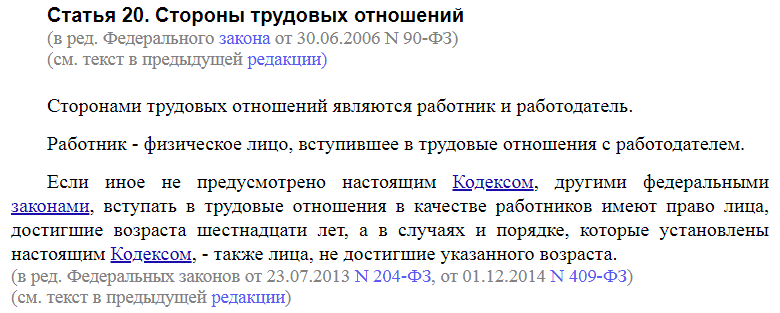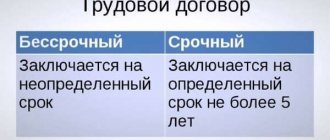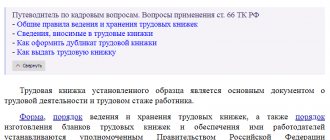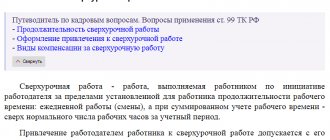Labor relations
Labor relations are legal relations into which an employee and his employer enter by mutual agreement.
Such a relationship implies that both parties have obligations to each other for the time that they cooperate. In addition to duties, everyone has their own rights, which must be mutually respected and must not be violated; they are prescribed in the employment contract. The procedure for concluding and terminating an employment contract, as well as all its conditions, are regulated by the Labor Code of the Russian Federation.
let's get acquainted
A complete list of information about the employee and employer that is required to be included in the employment contract is regulated by Art.
57 Labor Code of the Russian Federation. For an employee who is a citizen of Russia, it is enough to indicate the last name, first name, patronymic and details of an identity document. For the employer - name and TIN (for the employer - individual entrepreneur - last name, first name, patronymic and TIN). If the hiring party is an individual, only the last name, first name and patronymic are indicated in the contract. An employment contract with an employee can be concluded by an official authorized by order or power of attorney. In this case, the document must indicate the details of the order or power of attorney. And, of course, the place where the contract is concluded is indicated.
Temporarily staying foreign citizens or stateless persons additionally provide a work permit or patent, as well as a voluntary health insurance policy; temporarily residing foreign citizens or stateless persons - a temporary residence permit, permanently residing foreign citizens or stateless persons - a residence permit (Article 327.3 of the Labor Code of the Russian Federation).
Automate personnel records. Draw up employment contracts, effective contracts and additional agreements in the Kontur-Personnel program
To learn more
Worker
The subject of labor relations in the Russian Federation can be:
- Citizens of the Russian Federation.
- Foreign citizens.
- Stateless persons.
Legal capacity is given to everyone at birth and does not depend in any way on time. In other words, everyone has the right to work from the first to the last day of life.
People who have reached the age of 16 are recognized as legally capable It is possible to start working at the age of 15 if you have completed or stopped your education. A child can start earning money at the age of 14, but this should not interfere with his development, both moral and physical. If a child under 14 years of age is working, for example, acting in a commercial, then the contract must be concluded with the child’s representatives. Financial responsibility begins at the age of 18.
As for other areas of legal responsibility, the age is set in accordance with each of the legal branches (this is disciplinary, criminal and administrative responsibility).
To find out more about the rights of an employee, you should refer to Article 21 of the Labor Code of the Russian Federation , as well as to the collective and individual labor contracts.
To do this, simply enter the article number and the name of the code in the line of any search engine (Yandex, Google). In the very first versions of the search result, the texts of the law will be shown, where everything that concerns the employee as a subject of labor relations is written in small details.
9.1. Concept, parties and content of an employment contractIn the categories of subjective law, an employment contract must be considered in several aspects: - as a legal fact that gives rise to an employment relationship; - as a source of subjective labor law (labor rights and obligations of the parties to labor legal relations; - as a legal model of labor legal relations. In an objective sense, an employment contract is considered as an institution of labor law and labor legislation, that is, a system of legal norms on hiring (concluding an employment contract) , transfer to another job (changes in the employment contract) and dismissal (termination of the contract). The legal definition of the concept of an employment contract is contained in Article 56 of the Labor Code of the Russian Federation: “An employment contract is an agreement between the employer and the employee, according to which the employer undertakes to provide the employee with work according to stipulated labor function, ensure working conditions provided for by labor legislation and other regulatory legal acts containing labor law norms, collective agreements, agreements, local regulations and this agreement, pay the employee wages on time and in full, and the employee undertakes to personally fulfill certain this agreement, the labor function, to comply with the internal labor regulations in force for this employer.” Parties to the employment contract: 1) employee; 2) employer. Only an individual (a single human person) can act as an employee. As a general rule, the age at which it is possible to conclude an employment contract is 16 years, and only in cases established by law can it be 15, 14 years or even less (Article 63 of the Labor Code of the Russian Federation). This norm of domestic legislation is based on the requirements of the ILO Convention “On the Minimum Age for Employment”. An employer can be either an individual (in the case of performing work in the employer’s personal household or working for an individual entrepreneur) or a legal entity with legal capacity, that is, having the right to hire and fire employees. However, organizations can be parties to an employment contract without being a legal entity, if their founder - a legal entity - has given them the right to hire and fire, it has an independent payroll, balance sheet and labor plan (these are branches and representative offices of organizations). Contents of the employment contract. It consists of information about the parties to the contract and the range of conditions under which the employee’s labor is expected to be used and on which the parties agree. The content of an employment contract is the totality of its terms that define the rights and obligations of the parties, as well as information about the parties to the contract. According to Art. 57 of the Labor Code of the Russian Federation, the following information is indicated in the employment contract: - surname, name, patronymic of the employee and the name of the employer (surname, name, patronymic of the employer - an individual) who entered into the employment contract; — information about documents proving the identity of the employee and the employer - an individual; — taxpayer identification number (for employers, with the exception of employers - individuals who are not individual entrepreneurs); — information about the employer’s representative who signed the employment contract, and the basis on which he is vested with the appropriate powers;
Employer
In fact, anyone can become an employer. These are people just like you. When applying for a job, you need to remember this, and during work too, this can help in many daily issues and the correct building of relationships between superiors and subordinates. Then it is unlikely that unpleasant conflicts will arise that spoil the entire work process.
Employers are individuals who have registered an individual entrepreneur.
You can read about all the rights and obligations of an employer in great detail in Articles 303-309 of the Labor Code of the Russian Federation.
Employment contract
An employment contract is a document that sets out all aspects of the legal relationship between an employee and an employer.
It makes sense to read everything related to the employment contract in Section III, Chapter 10 of the Labor Code of the Russian Federation. It contains general information about the employment contract, i.e. its definition, content, terms and many special cases. The texts of the laws can be found in printed form in bookstores, or electronically on the Internet. As mentioned above, to find the text of an article, you must enter the name of the code, the number of the section, chapter and article in the search bar.
TD or GPA?
Another difficult issue is the distinction between employment and civil law contracts. Letter of the Federal Social Insurance Fund of the Russian Federation dated May 20, 1997 No. 051/160-97 “Recommendations on the distinction between an employment contract and related civil law contracts” contains a list of signs by which we can determine that we have before us an employment contract:
- the position is included in the staffing table or the employee is enrolled in the organization’s staff;
- the employee undertakes to perform any assigned work;
- the contract stipulates the labor function;
- the work is carried out over a certain period of time;
- the employee undertakes to perform a certain amount of work assigned during working hours, or he must complete a predetermined amount of work;
- the time worked is noted in the time sheet;
- the employee obeys the orders and instructions of the managers (supervisors) of the organization;
- the employee bears disciplinary liability under Art. 192 Labor Code of the Russian Federation;
- the employer has the right to reward the employee on the basis of Art. 191 Labor Code of the Russian Federation;
- the employee is subject to internal labor regulations (charter, regulations on production discipline);
- the employee performs the work personally.
By inviting the applicant to sign a civil contract, the customer does not guarantee the contractor paid leave, temporary disability payments, does not reimburse travel expenses, etc.
The conclusion of a civil contract that actually regulates labor relations between an employee and an employer entails the imposition of an administrative fine on officials in the amount of 10,000 to 20,000 rubles; for persons carrying out entrepreneurial activities without forming a legal entity - from 5,000 to 10,000 rubles; for legal entities - from 50,000 to 100,000 rubles (part 3 of article 5.27 of the Code of Administrative Offenses of the Russian Federation).
The employer will be forced, in addition to paying a fine, to include the employee in the workforce, provide all guarantees, compensation and benefits provided for by labor legislation, as well as pay additional social insurance contributions.
Kinds
Just as there is a wide variety of work activities, there are different contracts that act as guarantors of mutual relations between the parties. It makes sense to distinguish between types of employment contracts, because they differ not only in the structure of their filling, but also have different areas of application.
Agreement on joint labor activity
Registered individual entrepreneurs and commercial organizations, whose cooperation leads to profit, have the right to enter into an agreement of this type. This type of agreement can be concluded, for example, with a company that produces smartphones, if you have your own company that develops software for the latest technology. The procedure for creating a partnership is quite simplified; in addition, participants in a joint activity agreement have a number of tax advantages. Therefore, this type of agreement is quite common in Russia.
Employment contract
This agreement differs from others in that:
- Regulated by the Civil Code, not the Labor Code.
- The parties to the contract are the customer and the contractor.
- Concluded for a period of up to 5 years.
As with other types of contracts, the parties have rights and obligations that they must fulfill.
Contract
The most common. The contract ensures mutual responsibilities and rights of both parties. As stated above, both parties that signed it undertake to fulfill all the conditions specified in the contract, which should not contradict the current legislation of the Russian Federation.
Contents of the employment contract
- Place of work. For example, a store, warehouse, laboratory, etc.
- Start date (in some cases specific dates) of the work.
- Rights and obligations of the employee.
- Rights and obligations of the employer.
- Working conditions.
- Work and rest schedule.
- Terms of remuneration.
- The employee must be provided with social insurance, and the type of such and its conditions are specified in the contract.
It is possible to change the agreement, but both parties must agree to this, and this desire must be confirmed in writing.
Therefore, do not be afraid of sudden changes in your work functions without your knowledge. If you were not warned and you did not agree to this, then there is no need to carry out instructions that are not within your competence.
Article 20 of the Labor Code of the Russian Federation. Parties to labor relations
The parties to the labor relationship are the employee and the employer.
An employee is an individual who has entered into an employment relationship with an employer. Unless otherwise provided by this Code or other federal laws, persons who have reached the age of sixteen years have the right to enter into labor relations as employees, and in cases and in the manner established by this Code, also persons who have not reached the specified age. Labor Code of the Russian Federation
dated December 30, 2001 N 197-FZ

Full text of the article, guides, additional information - in ConsultantPlus
We have already noted more than once the violations of the structural logic of the Labor Code and its storyline in the Labor Code of the Russian Federation in general and in the second chapter in particular. Article 20 of the Labor Code of the Russian Federation, which is a structural component of the second chapter, demonstrates this in full.
Thus, chapter two, as conceived by the developers of the Labor Code, was intended to give a general definition of labor relations and the grounds for their occurrence. However, for some unknown reason, in a number of articles of the second chapter, the legislator deviated from the interpretation of this definition, and did so with a certain bias towards a casual (substantive) interpretation, which is unusual for the Russian legislative system.
Article 20 of the Labor Code of the Russian Federation, in addition to the “bias” towards casual law-making, also breaks the storyline of the second chapter, evading labor relations as a legal phenomenon, and instead of providing a legal framework, it gives a description of the parties to the labor relationship. From our point of view, this contradicts the provisions of the Labor Code in general.
The fact is that the basis of labor relations is an employment contract.
Based on the general principles of contract law, the concept of parties is specific to the contract, and not to legal relations as a whole.
For example, legal relations between spouses or relatives do not become contractual. That is, in order for the persons participating in the legal relationship to become counterparties, there must be an agreement.
It should be noted that the legislator fully agrees with this, since he indicates in Art. 56 as parties to the employment contract between the employee and the employer, without going into a detailed description of their characteristics. This, in fact, is the logical “breaking” of the storyline of the Labor Code of the Russian Federation, since it would be logical to give the characteristics of an employee and an employer not in the chapter related to labor relations, but in the article defining the parties to the employment contract.
Thus, a generally illogical situation is created in which Chapter 10, which regulates the employment contract, that is, the basis of labor relations, not only does not contain a description of the characteristics of the counterparties of the employment contract, but also does not even contain a reference to Art. 20 Labor Code of the Russian Federation. As a result, the user who applies to the Labor Code of the Russian Federation is forced to resort to the subsidiary application of the rules of law, combining Art. 20 and art. 56 of the Labor Code of the Russian Federation to get the full picture.
So, in accordance with Art. 20 of the Labor Code of the Russian Federation as an employer, considered in Art. 56 as a party to an employment contract should be understood as a legal or natural person:
- having the right to conclude employment contracts;
- having legal capacity and capacity.
As you can see, Art. 20 of the Labor Code of the Russian Federation has a large volume with an overall small amount of information contained in the meaning of the article. Typically, such cases are explained by a lack of legal technique of the legislator and a “bias” towards casuistic interpretation and unnecessary detail, which we discussed above.
So, the legal capacity of an individual is a set of characteristics that includes his ability to fully exercise his rights and fulfill his duties. Why did the legislator decide in Art. 20 of the Labor Code of the Russian Federation to interpret the standard legal definition given in Art. 21 of the Civil Code of the Russian Federation is unclear.
Yes, Art. 20 of the Labor Code of the Russian Federation contains a detailed description of the characteristics of an individual acting as an employer:
- majority;
- availability of the right to conclude employment contracts (availability of an appropriate license or appropriate registration as a business entity);
- legal capacity due to age or as a result of emancipation.
Individuals who do not meet these criteria have the right to enter into employment contracts with employees through representatives.
The characteristics of a legal entity acting as an employer, Art. 20 of the Labor Code of the Russian Federation refers to his legal capacity and the presence of the right to conclude employment contracts with employees. To understand the characteristics of the legal personality of a legal entity, it is necessary to refer to the Law of the Russian Federation “On Registration of Legal Entities” in the manner of subsidiary application of the rule of law.
Actually, this is all that relates to the description of the employer. The entire rest of the article on this topic can easily be classified as “chewing” legal definitions. As employers - individuals who have the right to conclude employment contracts with employees, Art. 20 of the Labor Code of the Russian Federation lists:
- individual entrepreneurs;
- private notaries and lawyers with the appropriate state license;
- individuals not engaged in entrepreneurial activities, in terms of concluding employment contracts with domestic workers.
A detailed description of the characteristics of individuals would seem to impose a ban on concluding employment contracts in which the employers are persons who do not meet the listed characteristics. That is, any contract concluded by an improper employer must be considered void.
However, apparently, remembering that the Labor Code of the Russian Federation must protect the interests of workers, the legislator makes in Art. 20 of the Labor Code of the Russian Federation takes an unexpected turn and establishes that an employment contract with an improper employer does not exempt the employer from fulfilling contractual obligations.
As an employee, Article 20 of the Labor Code of the Russian Federation considers individuals over the age of 16 years, and in cases determined by law, even younger than this age. In this case, Article 20, completely unreasonably, does not contain a reference to Art. 63 of the Labor Code of the Russian Federation, which determines in what cases and under what conditions the labor of persons under 16 years of age can be used.
Article 20 of the Labor Code of the Russian Federation does not detail the characteristics of an employee at all. This means that the user who turns to the Labor Code will again be forced to resort to the subsidiary application of the rules of law.
In this case, you will need to refer to Art. 15 of the Labor Code of the Russian Federation in order to conclude that the employee must meet the following criteria:
- be legally capable and have legal personality, for example, be a citizen of the Russian Federation or be a foreigner with a work permit in the Russian Federation, be at least 16 years old, etc.;
- be able to work within the scope of the work performed. Let us note that Art. 20 of the Labor Code of the Russian Federation does not contain an upper age limit. It should be assumed that ability to work according to the Labor Code of the Russian Federation is determined not by age, but by strength and ability to perform labor functions. However, there are a number of regulations that contain a restrictive age limit. For example, the Law of the Russian Federation “On Civil Service” sets the age limit for civil servants at 65 years;
- have experience or knowledge within the framework of the work carried out under TD.
In addition to listing the parties to the labor relationship, Art. 20 of the Labor Code of the Russian Federation also determines the procedure for exercising the rights and obligations of the employer. In accordance with the provisions of the article, the rights and obligations of the employer are exercised:
- an individual, if he is an employer;
- the head (governing body) of the employer - a legal entity;
- other persons entitled to represent the employer.
In part 12 art. 20 of the Labor Code of the Russian Federation contains a legal repetition, which lost force in 2014, of Article 120 of the Civil Code of the Russian Federation. Yes, Art. 20 of the Labor Code determines that the institution is liable for its obligations with the funds at its disposal, and in the absence of the necessary funds, the owner bears subsidiary liability.
Unfortunately, the legislator could not explain how part 12 of Art. 20 of the Labor Code applies to the parties to labor relations. It should be assumed that this applies to persons exercising the rights and obligations of a legal entity as an employer.
Hiring procedure
- Write an application for employment.
- Pass an interview.
- Familiarize yourself with local regulations, job specifics and responsibilities.
- Conclusion of an employment contract. Before signing an employment contract, both parties should study it carefully. You should not sign an agreement if you do not agree with something, this can lead to very unpleasant consequences, including dismissal.
- Receiving an employer's order to hire against signature.
Employer's liability
Art. 362 of the Labor Code of the Russian Federation establishes that managers and other officials who are guilty of violating legislation affecting labor issues are held accountable. It could be:
- administrative responsibility. When applying it, the employer pays a fine, the amount of which ranges from 10 to 30 times the wage. The exact amount is determined depending on the violation committed by the employer.
- Disciplinary responsibility. It is expressed in the application of disciplinary sanctions against employers - reprimand, reprimand or dismissal in accordance with the grounds established by Art. 192 Labor Code of the Russian Federation.
- Criminal liability. One of the reasons for its use is the dismissal of a pregnant woman or a mother on maternity leave to care for a child under 3 years of age. Such liability is determined by the Criminal Code of the Russian Federation, the penalties are a fine (its amount varies from 200 to 500 min. wages) or compulsory work.
In all cases, when concluding an employment contract with individuals, employers bear financial responsibility. It affects the obligations arising from the employment relationship.
Author of the article
Grounds for termination of an employment contract
You should always remember that you are not obligated to work in this particular place and in this position. In the same way, the employer is not obliged to provide the job specifically to you, especially if you do not satisfy each other.
- With mutual consent of the parties.
- If the term of the employment contract has expired.
- Termination at the request of the employee/performer or employer/customer.
- When transferring an employee to another position or place of work.
- An employee’s refusal to continue working activities due to a change in the owner of the organization’s property or reorganization of the place of work.
- An employee can terminate the contract if the employment contract is changed without his consent.
- An employee may refuse a transfer due to his medical conditions. It may also turn out that the employer does not have an appropriate place. For example, someone has received a disability, and now he must change his position because he is unable to perform his previous functions. But the company does not have workplaces suitable for people with disabilities.
- The employee's reluctance is transferred to another location along with the employer.
- Circumstances that do not depend on the will of both parties.
- Violation of the law by the contract if this interferes with the continuation of work.
Always read contracts carefully and do not agree to work without concluding them or with contracts where you don’t like something. Otherwise, you risk getting a job with poor working conditions or simply unsatisfactory responsibilities that you will have to perform, not receiving wages on time, or even at all. Always be attentive and careful, and do not let good employers down, they are worth their weight in gold.






